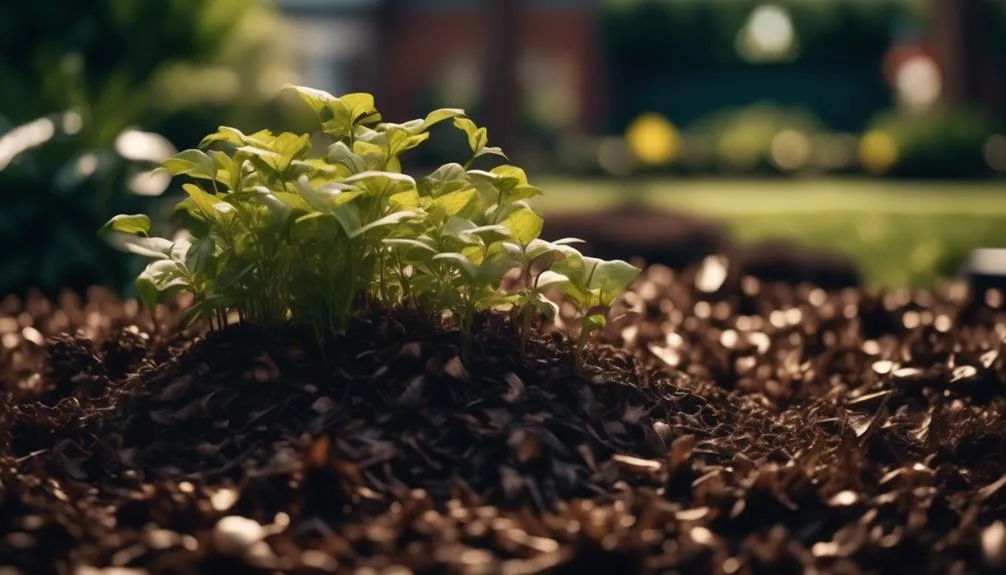You may have heard about the benefits of using mulch in your garden, but have you thought about using walnut tree mulch? It's a hot topic among gardeners and experts.
The use of walnut tree mulch in gardens has both pros and cons, from its nutrients to its impact on soil health.
Whether you're a seasoned gardener or just starting out, understanding the potential benefits and risks of walnut tree mulch can greatly affect your garden's success.
Key Takeaways
- Walnut tree mulch enhances soil fertility and promotes nutrient absorption, supporting long-term plant health and robust growth.
- It improves microbial activity and releases essential nutrients gradually, creating a nourishing soil environment.
- Walnut tree mulch acts as a natural weed barrier, reducing the need for chemical weed killers and retaining moisture by reducing evaporation.
- However, caution must be taken as different walnut tree species release varying levels of juglone, which can cause allergies and toxicity concerns. Proper species selection or aging of the mulch is important, and direct contact with plant roots should be avoided. Regular monitoring of plant health is recommended.
Nutrient-Rich Characteristics of Walnut Tree Mulch
Walnut tree mulch offers a plethora of nutrient-rich characteristics that can significantly enhance the health and vitality of your garden soil. When used as mulch, walnut tree leaves and hulls break down slowly, releasing essential nutrients such as nitrogen, potassium, and phosphorus, which are crucial for plant growth.
This organic material also improves soil fertility by enhancing nutrient absorption and promoting microbial activity. As the mulch decomposes, it creates a favorable environment for beneficial microorganisms, such as earthworms and fungi, which aid in breaking down organic matter and making nutrients more accessible to plants.
The steady release of nutrients from walnut tree mulch can help maintain a balanced and nourishing soil environment, essential for robust plant growth and overall garden health.
Impact of Walnut Tree Mulch on Soil Health
The presence of walnut tree mulch in your garden can have a significant impact on the overall health and vitality of your soil.
Walnut tree mulch is known for its ability to enhance soil fertility by gradually releasing essential nutrients into the soil as it decomposes. This gradual release of nutrients supports the long-term health of your garden soil, promoting robust plant growth.
Additionally, walnut tree mulch can positively impact microbial activity in the soil. It provides a favorable environment for beneficial microorganisms, such as bacteria and fungi, which play a crucial role in breaking down organic matter, releasing nutrients, and improving soil structure.
Weed Control and Moisture Retention With Walnut Tree Mulch
To effectively control weeds and retain moisture in your garden, walnut tree mulch offers a natural and beneficial solution. When you spread walnut tree mulch in your garden, you can expect the following benefits:
- Weed Prevention:
The thick layer of walnut tree mulch acts as a natural weed barrier, preventing weed growth by blocking sunlight and hindering weed seed germination. This reduces the need for chemical weed killers and tedious manual weeding, allowing you to enjoy a low-maintenance garden.
- Water Conservation:
Walnut tree mulch helps in moisture retention by reducing evaporation from the soil surface. This means less frequent watering for your plants and less water wastage, ultimately contributing to a more sustainable and eco-friendly garden.
Incorporating walnut tree mulch into your garden can significantly improve weed control and promote water conservation, making it an excellent choice for gardeners seeking natural and effective solutions.
Considerations for Using Walnut Tree Mulch in Gardens
When incorporating walnut tree mulch in your garden, it's important to consider factors such as tree variety, application methods, and potential effects on plant health.
Different walnut tree species have varying levels of juglone, a natural compound toxic to certain plants. Black walnut trees, for example, release higher amounts of juglone, which can inhibit the growth of sensitive plants. Before using walnut tree mulch, ensure that it comes from a non-toxic tree species or has been properly aged to break down the juglone.
Additionally, consider the method of application to prevent direct contact between the mulch and plant roots, reducing the risk of negative effects on nutrient absorption.
Potential Risks and Precautions of Using Walnut Tree Mulch
Considering the potential risks and precautions of using walnut tree mulch in your garden, it's important to be aware of the varying levels of juglone in different tree species and to take proactive measures to safeguard your plants' health.
When using walnut tree mulch, keep in mind the potential allergies and toxicity concerns associated with juglone, a natural compound found in walnuts and other related trees. To minimize risks and ensure the well-being of your garden, here are some important precautions to take:
- Monitor plant health regularly to detect any signs of distress or wilting.
- Look out for yellowing leaves, stunted growth, or wilting, which could indicate juglone toxicity.
- Consider using walnut tree mulch in moderation and avoid direct contact between the mulch and the stems or leaves of sensitive plants.
Conclusion
To sum up, while walnut tree mulch offers benefits like soil enrichment, moisture retention, and weed control, it's crucial to be mindful of potential risks to certain plants.
By taking precautions, you can harness the advantages of walnut tree mulch for your garden.
Consider the balance between its benefits and potential drawbacks, and make an informed decision that aligns with your gardening goals.

